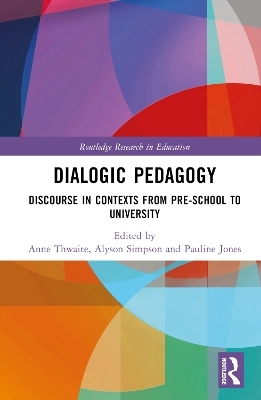
Dialogic Pedagogy
Routledge (Verlag)
978-1-032-28409-5 (ISBN)
While the contributors come from a range of theoretical backgrounds, they all share an interest in language in use and engage in close analysis of transcripts of naturally-occurring interaction. Taking inspiration from Alexander and other theorists, they employ a fine-grained and analytic approach to the exploration of their data. The authors make use of the linguistic tools and models of language in society, in order to examine the turn-by-turn unfolding of the interaction. The authors relate their insights from disparate forms of linguistic analysis to elements of Alexander’s (2020) dialogic framework, situating the discourse in its contexts and discussing the pedagogical implications of the linguistic choices at play.
In presenting this work from a range of situations and perspectives, the authors strive to demonstrate how dialogic discourse plays out in educational contexts across the world. The book aims to foster further research in this direction and to inspire educators to explore dialogic discourse for themselves. It will be of interest to a wide audience, including literacy researchers, linguists, teachers and teacher educators, as well as graduate students.
Anne Thwaite is a Lecturer in Language Education in the School of Education at Edith Cowan University (ECU) in Australia. Her research applies a functional perspective to spoken discourse analysis, including classroom discourse, critical discourse analysis and casual conversation. Alyson Simpson is a Professor in the Faculty of Arts and Social Sciences at the University of Sydney in Australia. Her research projects focus on the role of children’s literature in education, the power of dialogic learning and the formation of teacher professional identity through the lens of educational linguistics. Pauline Jones is Associate Professor, Language in Education in the School of Education, at the University of Wollongong in Australia. Her scholarship focuses on educational linguistics/semiotics, which she applies to studies of pedagogic dialogue, advanced literacy skills and teacher development.
Part 1: Theoretical framework
1. Research into dialogic pedagogy through the lens of educational linguistics
Alyson Simpson, Anne Thwaite and Pauline Jones
2. Classroom discourse analysis
Anne Thwaite
Part 2: Dialogic pedagogy in Early Childhood contexts
3. Perceiving, labelling and knowing: Mediating educational meanings through multimodal dialogue in Montessori early years classrooms
Susan Feez
4. The contribution of ‘sustained shared thinking’ to successful literacy transitions in English curriculum
Pauline Jones and Iram Siraj
5. "We’re going to do it together": Dialogic discourse with young children in Western Australia
Anne Thwaite
Part 3: Dialogic pedagogy in Primary School contexts
6. Dialogicality as embodied multimodal communication in primary schools
Christine Edwards-Groves and Christina Davidson
7. Scaffolding dialogue with marginalised students in the middle years
Helen Harper and Bronwyn Parkin
8. The changing patterns of classroom interaction: Teacher interventions in students’ creative collaboration in makerspaces
Kristiina Kumpulainen, Anu Kajamaa and Jasmiina Leskinen
Part 4: Dialogic pedagogy in Secondary School contexts
9. Writing talk: Investigating metalinguistic dialogue about written texts
Debra Myhill and Ruth Newman
10. Street Smarts: A developing critical thinking talk framework for adolescents
Maree Davies, Simon Esling and Patrick Girard
11. When monologue isn’t: Towards a linguistic description of Alexander’s six principles
Erika Matruglio
Part 5: Dialogic pedagogy in Tertiary Education contexts
12. Dialogic pedagogy: blended learning in initial teacher education
Alyson Simpson and Tinjia Wang
13. A dialogic approach to teacher professional development
Carole Bignell
14. Dialogic dimensions of seminars in higher education
Marion Heron
15. Collaborative knowledge building: the dynamic life of ideas in online discussion forums
Janine Delahunty, Pauline Jones and Irina Verenikina
Part 6
16. Epilogue
Robin Alexander
| Erscheinungsdatum | 17.07.2023 |
|---|---|
| Reihe/Serie | Routledge Research in Education |
| Zusatzinfo | 57 Tables, black and white; 10 Halftones, black and white; 10 Illustrations, black and white |
| Verlagsort | London |
| Sprache | englisch |
| Maße | 156 x 234 mm |
| Gewicht | 880 g |
| Themenwelt | Geisteswissenschaften ► Sprach- / Literaturwissenschaft ► Anglistik / Amerikanistik |
| Geisteswissenschaften ► Sprach- / Literaturwissenschaft ► Literaturwissenschaft | |
| Geisteswissenschaften ► Sprach- / Literaturwissenschaft ► Sprachwissenschaft | |
| Sozialwissenschaften ► Pädagogik ► Schulpädagogik / Grundschule | |
| ISBN-10 | 1-032-28409-9 / 1032284099 |
| ISBN-13 | 978-1-032-28409-5 / 9781032284095 |
| Zustand | Neuware |
| Informationen gemäß Produktsicherheitsverordnung (GPSR) | |
| Haben Sie eine Frage zum Produkt? |
aus dem Bereich


